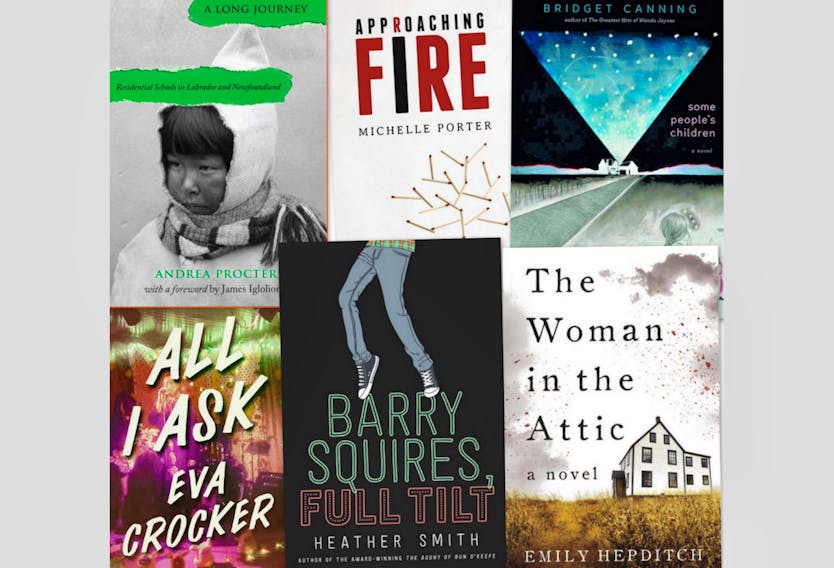ST. JOHN'S, N.L. — For 21 years, the annual BMO Winterset Award has celebrated Newfoundland and Labrador writers across all genres.
Executive director of ArtsNL Reg Winsor said the prize of $12,500 for the winner and $3,000 for two other finalists makes it one of the biggest literary awards in Atlantic Canada.
It was established in 2000 in honour of the award-winning social historian Sandra Fraser Gwyn.
BMO Winterset Award Longlist - https://t.co/ve5FOzPNMX#nlarts #canlit @bridgetcanning @mepindependent pic.twitter.com/yLKNji6D41
— Breakwater Books (@BreakwaterBooks) February 15, 2021
“She had done such a tremendous job of promoting a national awareness of the arts of this province,” Winsor said. “To this day, the award celebrates and supports Newfoundland and Labrador writers … and excellence in Newfoundland and Labrador writing.”
Winsor said narrowing down the submissions to a longlist and then a shortlist, which will be announced March 1, is a difficult task given the variety of genres and the talent of the writers.
There were fewer submissions from 2020, Winsor said, with 23 in total. He says the COVID-19 pandemic must have played a role and hopes they’ll get back to the typical 30 to 32 submissions by next year.

The long list and writing during COVID-19
Bridget Canning’s novel “Some People’s Children” takes place in the late 1980s and early ‘90s and is about a girl named Imogene Tubbs.
“She realizes that what she’s been told about who her father is, is not what anyone believes,” Canning said. “It’s a coming-of-age story about growing up a product of gossip.”
Canning typically writes in the morning, getting her first ideas out while her coffee is brewing.
“Before the pandemic, I used to really like going for a walk … (or) sitting in a coffee shop and writing,” she said.
The COVID-19 pandemic has affected her writing because so much of the inspiration comes from being in proximity to people, being able to talk to them and listen to them, she said.
“The actual physical distance and the loss of opportunity to be able to mingle with people adds to that isolation,” Canning said.

“A Long Journey: Residential Schools in Labrador and Newfoundland” is a book that anthropologist Andrea Proctor says was terrifying to write.
“The main point of the book is to highlight the stories of former boarding school students … to create a book that would tell their stories from their perspective,” she said. “The weight of the responsibility was huge.”
It was important for her to get it right, Proctor said.
“From people in Labrador, which is my main concern, my audience with the book … from what I’ve heard, feel that it does reflect and it’s wonderful to have it longlisted,” she said. “I had always assumed that Winterset was for fiction. I didn’t even realize that it could be a possibility, so it was a huge honour.”
Proctor considers herself a researcher first, but still does a lot of writing in her anthropology work.
“I pretty much wrote the book at my dining room table,” she said. “But I work from home anyway, so this is my office. COVID didn’t really change that much in my daily life.”

Heather Smith found out she had made the longlist for her teen novel “Barry Squires, Full Tilt,” when her friend wrote to her to congratulate her.
“It came as a big surprise. I was thrilled,” she said. “It really is a special one, because it’s from my home province.”
The book is about a young fellow who is a little bit of a hard case, she said.
“He thinks he wants to be an Irish step dancer because he feels that will make him stand out,” Smith said.
It’s about his large family and the community that surrounds them, which uses humour to balance the sadness.
Since the COVID-19 pandemic began, Smith has been writing more, she said.
“I know a lot of writers who have been finding it difficult to be creative,” she said. “At the beginning it might have been like that for me, too. You’re following the news, which feels pretty stressful and makes it hard to concentrate, but after a few weeks I just accepted what was happening.
“I feel very fortunate to be able to hunker down in my house and escape into another world through writing.”

“The Woman in the Attic” is 23-year-old Emily Hepditch’s first published novel.
“It’s a psychological thriller and it’s set on the south coast of Newfoundland,” she said. “It follows the story of Hannah Fitzgerald, who returns to her mother’s dilapidated saltbox house to prepare her for the move into assisted living.”
While there, she discovers a trap door to an attic she didn’t know existed.
Recent Winterset winners
- Megan Gail Coles wins second BMO Winterset Award
- Heather Smith wins Winterset Award
- Joel Thomas Hynes grateful, humble upon winning BMO Winterset Award
“She’s grown up in isolation in this house and all of the sudden stumbles upon some pretty big secrets she didn’t know existed until now,” she said.
Hepditch said she was in disbelief when she found out she was on the longlist.
“I was completely shocked,” she said. “There are some very, very talented people in this province who are writing all sorts of things and to be acknowledged amongst them is so humbling.”
Her writing habits tend to vary day to day, she said, and being disciplined with her writing has been difficult during the pandemic.
“I am working from home now and I find it a little bit more challenging,” Hepditch said. “What I normally do is that I set a word count goal … and then by the end of the day I have to reach that goal.”

Michelle Porter’s “Approaching Fire” is a latticework of genres that tells the story of her great-grandfather’s career as a Métis fiddler and performer.
“At the same time, it tells stories of my own journey of … healing from, or coming to terms with, intergenerational trauma,” she said.
A book of creative non-fiction, it uses history, poetry, letters, photography and more to tell the story.
When Porter was writing, she was in an office in a heavy-traffic, open area of a “lovely little green rowhouse” downtown with two bedrooms and two kids.
“Before the pandemic, I would work there all day and be by myself and could focus and it was lovely,” she said. “When the pandemic hit … I learned a new skill.”
As a mother, she is very tuned in with her kids and their needs.
“For the very first time … I had to learn to ignore everybody,” Porter said. “It wasn’t something I learned easily.”
Her family has since moved into another house, where she no longer needs that new skill as much because she has her own office with a door.
“Which has been absolutely lovely,” she said.

“All I Ask” is the first novel, but second book, Eva Crocker has had published.
Finding out she was on the longlist was exciting, she said.
“I’m honoured, especially because there’s lots of other writers on there that I admire and others I haven’t read yet that I’m excited to,” Crocker said.
The book was written over about two years and is inspired by an experience Crocker had with the police in 2017.
“(They) forced entry into my home and they told me I was under arrest for child pornography, which actually wasn’t true,” she said. “It turned out they were acting on old information. They were looking for someone I had never met who had lived at my address … almost a year prior.”
It was frightening, Crocker said, and it shocked her when she thought about how different it could have been if she had children, if she had a health condition or if English wasn’t her first language.
“It’s also a queer love story,” she said. “It’s about having the power to disclose things about yourself to the world and what it feels like to have that taken away.”
One thing that has changed about Crocker's writing life because of the COVID-19 pandemic is that she started teaching online workshops.
“It’s been really fun because there’s been people from all over the country,” she said. “I’ve met so many people and got to read their work and that was very inspiring."
Andrew Waterman reports on East Coast culture.









